China makes its mark in Davos
Updated: 2014-01-17 09:28
By Fu Jing (China Daily Europe)
|
|||||||||||
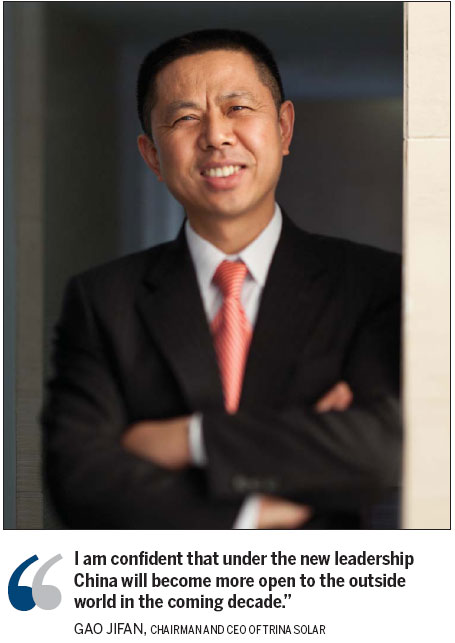
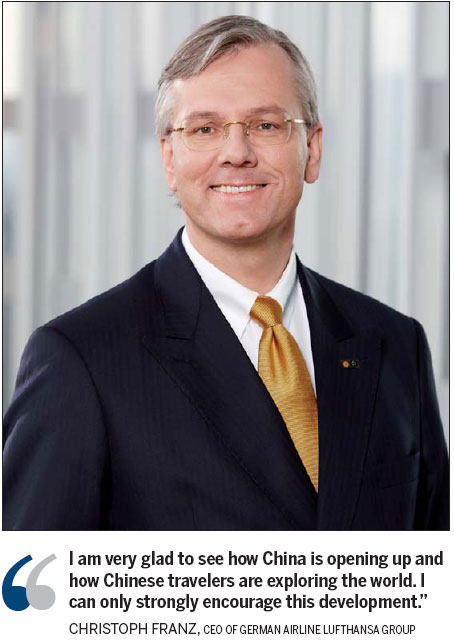
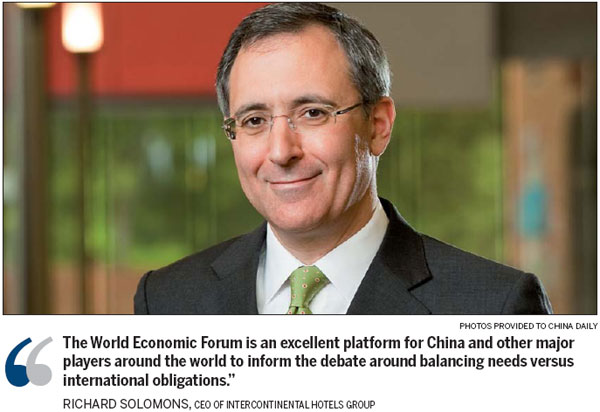
Reform agenda will receive much attention at conference
Two recent significant developments will help put China under the spotlight among the global shakers and movers when they meet in the Swiss ski resort of Davos over four days from Jan 22.
One is China's highest leaders announcing in November that there would be decisive market-oriented programs to extend reform. The other is the frosty relationship between China and Japan, which has reached freezing point after Japanese Prime Minister Shinzo Abe visited a shrine to war criminals in Tokyo recently.
For the latter, China seems to be well prepared to make its case at the annual meeting in Davos of the World Economic Forum and to reiterate its goals of peaceful development.
Shortly after the Chinese Foreign Minister Wang Yi takes part in a United Nations conference on Syria in Geneva, he is due to go to Davos. Abe has confirmed that he, too, will attend.
Leaving aside the concerns that are being voiced about the standoff between China and Japan, businesses leaders and analysts say China has been creating opportunities for the rest of the world by reshaping itself, and they say its new reform agenda continues that momentum.
Among the optimists is Christoph Franz, chairman of the executive board of the German airline Lufthansa Group and the company's chief executive officer, who will be in Davos. China's role in global dialogue is a lot stronger than most people in the West seem to realize, he says.
China has the wherewithal to present its story in platforms such as the Davos forum, he says.
"China has lately done first of all one thing: China has reshaped China." Change in China over the past decade is so monumental that it is hard for the West to comprehend, and the country's developments are a major topic of discussion wherever global issues are discussed, he says.
"I am very glad to see how China is opening up and how Chinese travelers are exploring the world. I can only strongly encourage this development, and that's not just because I am keen to grow our aviation business or to sell more tickets in China."
The cultural aspect of international exchanges and travel cannot be underestimated, he says.
"International travel brings more peace, understanding and happiness to the world."
The WEF was first held 43 years ago. Its founder, Klaus Schwab, visited China in 1979, when the country was starting to open up, and the country's participation in the event has grown steadily over the years.
While the biggest multinational companies feature heavily in the forum, Schwab has corralled a clutch of growing companies in developing countries and organized a summer Davos, rotating between China's coastal cities of Dalian and Tianjin since 2007.
Gao Jifan, chairman and CEO of Trina Solar, a Chinese company that makes photovoltaic modules, says that as China's role in the Davos forum has grown, many of the country's top firms take part in discussions that Western companies traditionally dominate.
However, China needs to put more effort into its participation in Davos, Gao says.
"Change is slow. Trina Solar, for example, is still the only Chinese company in the energy companies group," says Gao, who has attended the winter Davos several times.
Trina is the first Chinese company to join in energy discussions in Davos, and says it hopes Chinese leaders in the utility, traditional energy and other renewable energy fields will join the US, European, Latin American, Indian and Japanese companies in debate.
"China is the world leader in solar, wind, hydropower and solar thermal, but in many institutional bodies globally, including the Davos forum, we do not yet have a proportionate presence," Gao says.
Because China's new leadership has comprehensive reform as its top priority, the implications of that for the world will be high on the agenda in Davos, he says.
"I am confident that under the new leadership China will become more open to the outside world in the coming decade and the private sector will play a more important role."
Niels Christiansen, president and CEO of the Danish company Danfoss, which sells cooling and heating products and services, says China has been the center of attention for many years because of its increasing importance politically and economically.
"Talking about China's participation in the global dialogue, I believethat we should make the judgment only after comparing the current status with the situation three years, five years, or 10 years ago," Christiansen says. "Then you'll realize China is getting a lot more actively involved in global dialogue and starting to take on the role of a large economy."
Since China's new leaders took office early last year, Christiansen says, his company has taken note of the political trends, including financial and land reform and the drive against official corruption.
"These measures are steering China toward healthier economic development, which is particularly important when the world economic outlook remains gloomy and no country is immune from rising risks."
Richard Solomons, CEO of InterContinental Hotels Group, says that as a major business that employs more than 350,000 people in more than 100 countries and territories, it has a duty to help shape global debate on the key issues facing companies and government.
Solomons, a newcomer to the forum in Davos, says holding the forum's annual summer meeting of "new champions" in Dalian and Tianjin shows China's standing and its importance to the global agenda.
China has a hugely important role in the conversation on "reshaping the world", he says.
"The World Economic Forum is an excellent platform for China and other major players around the world to do just that and to inform the debate around balancing needs versus international obligations."
Daniel Gros, director of the Centre for European Policy Studies in Brussels, says a forum like Davos obviously cannot change the world but it can be a useful venue for political leaders to discuss the challenges the global economy faces. "That is what it does in an excellent way. And every participant in Davos knows that China is the big story in the world's economy and there is almost no discussion in which China does not figure prominently."
Matthew Powell, CEO of Primax Advanced Solutions, a green energy provider in Hong Kong, says China's participation in the forum brings an invaluable non-Western perspective and fresh energy and ideas from the world's leading growth economy.
This year the participants may debate the Chinese leadership's idea of the Chinese dream and the country's reform agenda, he says.
"We see the launch of the Chinese dream and reform agenda as a positive sign that China's new leadership wishes to inspire its citizens in coping with the challenges in continuing domestic reform, while simultaneously focusing on the quality of development and environmentally sound urbanization."
Li Xiaofei in Brussels contributed to this story.
fujing@chinadaily.com.cn
(China Daily European Weekly 01/17/2014 page4)
Today's Top News
Xi writes to Chinese in German colleges
China software to rival Android
Will China dominate the world?
Mainland policy lures HK students
Obama tells Germans he will not wiretap
Party is over for SOEs conferences
Egypt referendum wins support
Home prices continue to climb
Hot Topics
Lunar probe , China growth forecasts, Emission rules get tougher, China seen through 'colored lens', International board,
Editor's Picks

|

|

|
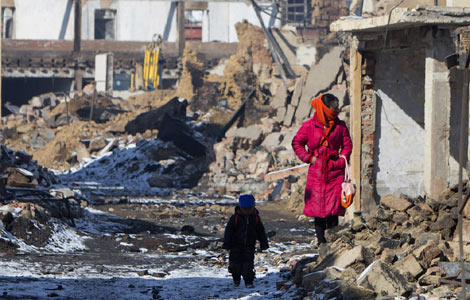
|

|
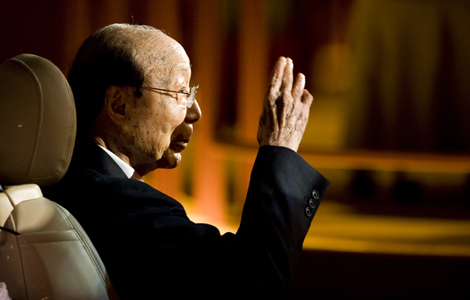
|





